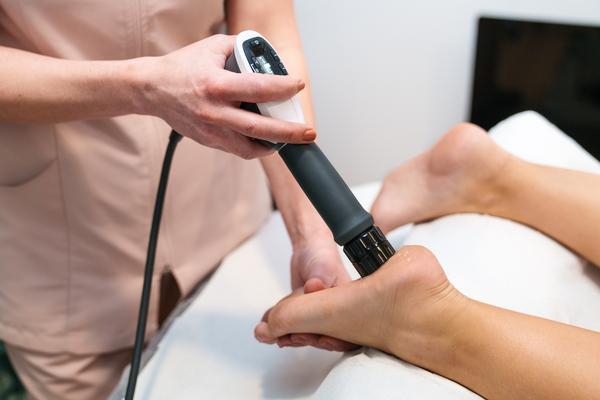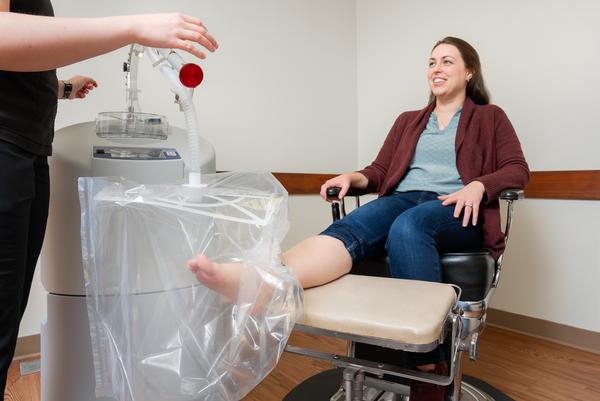Wilks Advanced Foot Care in Roseburg is southern Oregon’s trusted source for skilled podiatry treatment. Our experienced podiatrist, Dr. Jason Wilks, prioritizes conservative care and non-surgical alternatives to help patients get back on their feet.
 Diabetic Foot Care
Diabetic Foot Care
Diabetes puts your feet at risk for numerous complications. Fortunately, poor podiatry health doesn’t have to be a forgone conclusion. At Wilks Advanced Foot Care, our experienced Roseburg podiatrist, Dr. Jason Wilks, provides comprehensive care for diabetic patients. Schedule an appointment to discover why patients in Douglas County and throughout Southern Oregon have trusted us to care for their feet for more than two decades.
 Forefoot Pain Treatment
Forefoot Pain Treatment
Are painful bunions, hammer toes, or other forefoot problems keeping you from enjoying life? Don’t put up with podiatry pain slowing you down. At Wilks Advanced Foot Care, our Roseburg podiatrist offers comprehensive care, including innovative therapies and personalized treatment plans to help Oregon patients get back on their feet. Discover why our family-owned practice is Douglas County’s top choice for top-notch podiatric care.
 Heel Pain Treatment
Heel Pain Treatment
Are you tired of heel pain haunting your every step? Don’t let painful heels prevent you from enjoying the Umpqua Valley’s rugged outdoor lifestyle. At Wilks Advanced Foot Care, trusted Roseburg podiatrist Dr. Jason Wilks offers effective solutions and personalized treatment plans to help southern Oregon patients overcome heel pain and return to their favorite activities.
 Pediatric Foot Care
Pediatric Foot Care
Is foot or ankle pain making your child’s every step uncomfortable? At Wilks Advanced Foot Care, our Roseburg podiatrist, Dr. Jason Wilks, offers comprehensive care to help young patients overcome common pediatric foot concerns and lay a strong foundation for lifelong podiatric health and mobility. Discover why our family-owned practice is a top choice for top-notch foot care for families throughout southern Oregon.
 Skin & Nail Care
Skin & Nail Care
Are skin or toenail problems causing discomfort or making you too embarrassed to show off your feet? Don’t let ingrown toenails, heel fissures, or other podiatric skin or nail concerns shake your confidence. At Wilks Advanced Foot Care, we offer complete care for skin and toenail conditions, including the latest, most effective therapies. Discover why we’re Douglas County’s top choice for top-notch foot care for the entire family.
 Wound Care
Wound Care
A slow-healing foot wound isn't just inconvenient—it's a serious health concern that requires prompt professional evaluation and treatment. Without proper care, cuts, blisters, and other sores that aren't healing properly can increase your risk of infection, which is particularly dangerous for people with diabetes or circulation issues. Don't let slow-healing wounds or diabetic ulcers threaten your health or mobility. At Wilks Advanced Foot Care, our Roseburg, Oregon, podiatrist combines 25 years of expertise and state-of-the-art therapies to help patients with foot wounds heal.
 Peripheral Neuropathy Treatment
Peripheral Neuropathy Treatment
The pain, numbness and tingling of peripheral neuropathy disrupts daily life and increases the risk for ulcers. While existing nerve damage can't be reversed, Dr. Jason Wilks can treat neuropathic pain to improve your quality of life. With multiple treatment options, we can even help those who have failed to find relief from first line therapies.
 Shockwave Therapy
Shockwave Therapy
Shockwave Therapy is a cutting-edge technological procedure that treats foot, heel and ankle pain at the source by triggering the body’s natural healing response. Sessions last mere minutes, and don't involve injections or any downtime. Afterward, you can resume your daily activities immediately, and you don't have to follow up with time consuming physical therapy.
 Vaporox Wound Care
Vaporox Wound Care
Why struggle with hard-to-heal wounds? When we add FDA-approved Vaporox (VHT) in Roseburg, OR to standard wound care protocols, we can successfully heal 84% of chronic wounds
Clearanail Fungal Toenail Treatment
Fungal toenail infections are notoriously hard to resolve because the source of the problem remains buried beneath the nail. With Clearanail fungal toenail treatment, we can uncloak the infection so that topical treatments can quickly resolve the problem, often with just one application. This dramatically reduces healing time, helping quickly restore the appearance of your healthy toenail.
Onyfix Ingrown Toenail Treatmen
In the past, treating ingrown toenails was a painful process. Even worse, the ingrown toenails often returned after treatment. Now, with Onyfix, treating an ingrown toenail is a painless process and the treatment provides lasting results without injections or surgery.
 KeryFlex
KeryFlex
Treating a fungal toenail is a lengthy process. With KeryFlex, you can cover your embarrassing fungal toenail without compromising your recovery, creating the illusion of a healthy nail. Finally, you can show off your toes again, enjoying pedicures and your favorite open-toed shoes, thanks to the KeryFlex Nail restoration system.
Custom Orthotics
Unlike over-the-counter insoles, custom orthotics and braces can correct imbalances and foot concerns that are specific to your body. Providing non-invasive solutions to foot pain, chronic inflammation, drop foot and more, these medical devices can be worn with most shoes and provide effective relief when worn as directed.
